The Asia Pacific In-Car Entertainment System Market is estimated to be valued at USD 3.1 billion in 2025 and is projected to reach USD 6.8 billion by 2035, registering a compound annual growth rate (CAGR) of 8.0% over the forecast period.
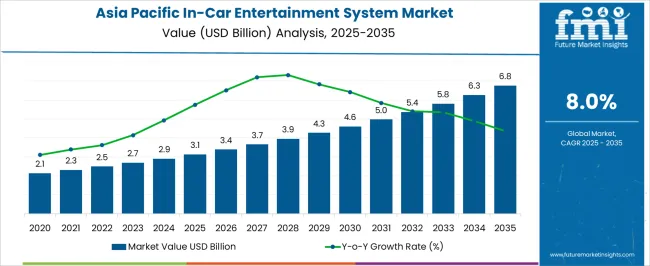
| Metric | Value |
|---|---|
| Asia Pacific In-Car Entertainment System Market Estimated Value in (2025 E) | USD 3.1 billion |
| Asia Pacific In-Car Entertainment System Market Forecast Value in (2035 F) | USD 6.8 billion |
| Forecast CAGR (2025 to 2035) | 8.0% |
The Asia Pacific in-car entertainment system market is experiencing significant expansion, driven by rising consumer expectations for enhanced in-vehicle experiences and growing integration of digital infotainment in automobiles. The proliferation of connected vehicles, coupled with rapid advancements in touch-based interfaces, audio-video streaming capabilities, and real-time navigation support, is fostering the transition from traditional infotainment units to intelligent entertainment systems.
The growing penetration of 5G connectivity and cloud-based services has further enabled seamless integration of smartphones, voice assistants, and real-time media access within vehicles. Additionally, regulatory encouragement for driver safety and the increasing adoption of electric and premium vehicles across emerging markets such as India, China, and Southeast Asia are strengthening the market outlook.
Automakers are prioritizing the incorporation of multi-functional infotainment dashboards as a differentiating factor, which is leading to a notable increase in embedded displays and customizable user interfaces As user-centric vehicle design becomes more prominent, the market is expected to witness a sustained shift toward immersive and personalized in-car entertainment platforms across the region.
The market is segmented by Product Type, Channel Type, and Vehicle Type and region. By Product Type, the market is divided into Video Display Screen, Audio Players, Navigation, Accessories, Rear Seat Entertainments, Speakers, and Others. In terms of Channel Type, the market is classified into OEM’s and Aftermarket. Based on Vehicle Type, the market is segmented into Passenger Vehicle and Commercial Vehicle. Regionally, the market is classified into North America, Latin America, Western Europe, Eastern Europe, Balkan & Baltic Countries, Russia & Belarus, Central Asia, East Asia, South Asia & Pacific, and the Middle East & Africa.
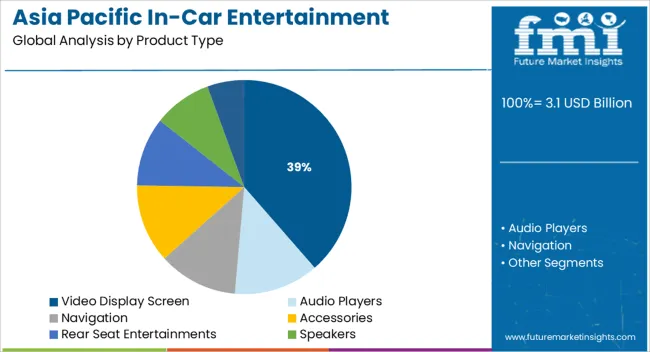
The video display screen segment is projected to hold 38.6% of the total revenue share in the Asia Pacific in-car entertainment system market in 2025, positioning it as the leading product type. This growth has been fueled by the increasing demand for high-resolution multimedia interfaces and enhanced passenger comfort features across various vehicle classes.
Video display screens have gained prominence as consumers seek seamless access to navigation, media streaming, rear-view assistance, and real-time vehicle diagnostics through a centralized interface. The segment's growth has also been driven by automakers’ focus on multi-display dashboards, integrated control panels, and heads-up displays, which enhance both driver experience and passenger engagement.
Software upgrades allowing over-the-air updates and app-based media control have further elevated the value proposition of display screens within vehicles Additionally, the growing presence of luxury and electric vehicles in urban centers has catalyzed the inclusion of premium video display features as standard offerings, reinforcing their widespread adoption.
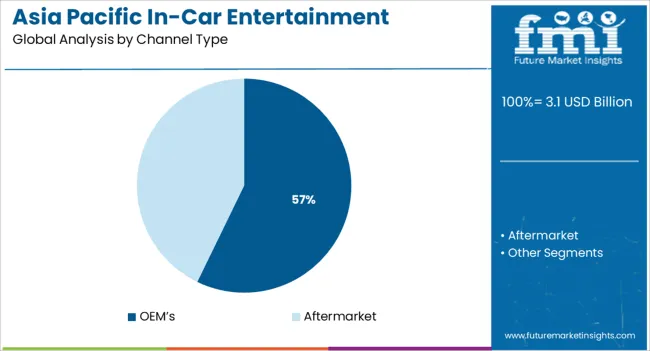
The OEM’s channel is expected to account for 57.2% of the total revenue share in the Asia Pacific in-car entertainment system market in 2025, making it the most dominant channel type. This leadership is being influenced by the integration of infotainment solutions directly during the vehicle manufacturing process, which ensures compatibility, seamless function, and lower aftermarket customization requirements.
OEM-fitted systems often offer superior build quality, software stability, and user interface consistency, leading to enhanced customer satisfaction and brand loyalty. Automotive manufacturers are leveraging partnerships with technology providers to co-develop proprietary entertainment ecosystems, offering advanced voice control, gesture recognition, and cloud-based content delivery.
Additionally, in response to increasing competition, OEMs are standardizing premium entertainment features across mid-range vehicle models, which has expanded their consumer base The capability to synchronize these systems with vehicle telematics and ADAS frameworks further enhances their functionality, making OEM channels the preferred mode for deploying in-car entertainment solutions in the region.
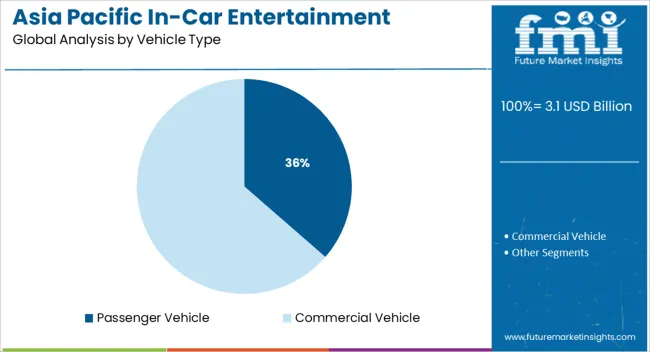
Passenger vehicles are projected to contribute 36.4% of the overall revenue share in the Asia Pacific in-car entertainment system market in 2025, making it the leading vehicle type segment. The dominance of this segment is supported by rising disposable income, urbanization, and consumer preference for digitally enhanced personal vehicles across major Asia Pacific economies.
Passenger cars are being increasingly equipped with advanced infotainment systems to meet demands for entertainment, navigation, and hands-free communication during commutes and long-distance travel. Automakers have been actively embedding multimedia solutions into dashboards and rear-seat areas, especially in SUVs and sedans, to differentiate their offerings in highly competitive markets.
The adoption of app-based infotainment, voice-integrated controls, and smartphone mirroring functionalities has become a key selling point for passenger vehicles Moreover, growing trends in ride-hailing and car-sharing services have prompted fleet operators to prioritize in-car digital engagement, contributing to the segment’s sustained growth and technological adoption.
Analysis of the market for in-car entertainment systems from 2020 to 2024 revealed a historical growth rate of less than 6.9% CAGR, with the market expansion being driven by the general expansion of the automotive industry as customers increased spending due to rising disposable incomes.
Between 2014 and 2024, the market for in-car entertainment systems is anticipated to double in size. Most of the factors anticipated the market's expansion not only in the Asia-Pacific region but also globally. When compared to others, the Asia-Pacific region shows promising growth in the market.
The COVID-19 pandemic initially caused recessionary downturns in the form of decreased demand and sales, store closures, and temporary pauses in the manufacturing cycle, which temporarily shattered growth expectations.
However, industrial production activity in significant markets has resumed as a result of infection curves flattening as of 2025. As a result, FMI’s Asia Pacific In-Car Entertainment System demand projection predicts a CAGR of 8.0% by 2035.
Three key factors are driving the market: an increase in the global passenger car market; expanding transportation and communication infrastructure; and rising consumer knowledge of the advanced features of in-car entertainment systems. Smart technology gadgets have become a crucial part of customers' lifestyles in recent years. These systems now have powerful graphical user interfaces, speech recognition, intuitive touchscreens, and other features due to advances in technology. All of these developments are encouraging for the market for in-car entertainment within the anticipated time frame.
Customers are able to purchase high-end and luxury vehicles with these systems due to the rising levels of disposable wealth in emerging economies, particularly in the Asia-Pacific. In the APAC region, the demand for in-car entertainment systems is anticipated to skyrocket. In-car entertainment systems have certain key advantages, including greater connectivity, a better user experience, hands-free operation, and a variety of entertainment alternatives.
Upgraded technologies like smartphone connectivity with their application compatibility, internet-enabled features, numerous USB ports, Bluetooth interface and wireless connectivity, and enhanced HD audio and video playback capabilities are being developed by manufacturers of in-car systems. This ongoing technological advancement is expected to increase the value and boost the in-car entertainment system market throughout Asia Pacific.
The high cost of innovative technology and services in entertainment systems would stymie revenue growth of car entertainment units in the car infotainment industry. The rise of car entertainment systems in the market for the automotive sector will face significant obstacles due to a lack of knowledge and a competent workforce. During the aforementioned projection period, technological limitations, cybersecurity risks, and a lack of smooth connectivity will also function as significant market restraints that will impede the development of car entertainment systems in the vehicle infotainment market.
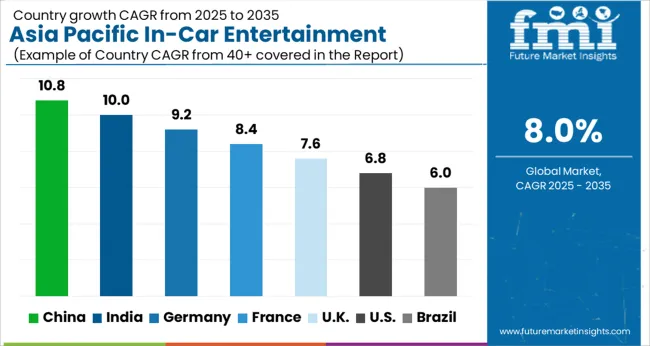
The presence of major automakers like Hyundai, Ford, Volkswagen, and Toyota is projected to help APAC continue its leadership in the global in-car entertainment systems industry. The largest markets for in-car entertainment systems are China and India, both of which have expanding consumer electronics markets. Due to the maturity of the automotive sector in Japan and South Korea, the market for in-car entertainment systems is anticipated to expand at a moderate rate.
Due to rising passenger vehicle penetration, rising per capita income, and rising demand for in-car entertainment systems, China is anticipated to show the highest CAGR between 2014 and 2024, followed by India.
India is the fourth-largest producer of automobiles in the world. The nation's growing population, increased disposable income, and the simplicity of obtaining credit and financing all support the automotive industry. The market is also anticipated to see increased demand for commercial vehicles due to the expanding logistics and passenger transportation sectors. Government programmes and policies have a significant impact on market growth and are directly boosting the In-Car Entertainment System market within the country and Asia Pacific Region.
The key players in the in-car entertainment systems market are focusing on R&D operations to produce cutting-edge and affordable products with upgraded features for end consumers. Panasonic Corporation, Delphi Automotive PLC, Alpine Electronics Inc., Denso Corporation, Harman International Industries, Pioneer Corporation, Robert Bosch GmbH, and JVC KENWOOD Corp. are some of the prominent participants in the APAC in-car entertainment systems industry.
MeeGo and Aha-Harman are two of the major participants in the services industry. For in-car entertainment systems, Intel Corporation, Luxoft Holding, and Nuance Communications are the main software (platform) providers. Leading automakers are collaborating closely with software development firms to create a cutting-edge solution that will give them an advantage over rivals.
| Attribute | Details |
|---|---|
| Growth Rate | CAGR of 8.0% from 2025 to 2035 |
| Base Year for Estimation | 2025 |
| Historical Data | 2020 to 2024 |
| Forecast Period | 2025 to 2035 |
| Quantitative Units | Revenue in USD Million, Volume in Units and CAGR from 2025 to 2035 |
| Report Coverage | Revenue Forecast, Volume Forecast, Company Ranking, Competitive Landscape, Growth Factors, Trends and Pricing Analysis |
| Segments Covered |
Product Type, Channel Type, Vehicle Type, Countries |
| Key Countries Covered |
China, Japan, India, ASEAN, Oceania |
| Key Companies Profiled |
Panasonic Corporation; Aptiv Plc; Alpine Electronics Inc.; Denso Corporation; Harman International Industries; Pioneer Corporation; Robert Bosch GmbH; JVC KENWOOD Corp. |
| Customization & Pricing | Available upon Request |
The global asia pacific in-car entertainment system market is estimated to be valued at USD 3.1 billion in 2025.
The market size for the asia pacific in-car entertainment system market is projected to reach USD 6.8 billion by 2035.
The asia pacific in-car entertainment system market is expected to grow at a 8.0% CAGR between 2025 and 2035.
The key product types in asia pacific in-car entertainment system market are video display screen, audio players, navigation, accessories, rear seat entertainments, speakers and others.
In terms of channel type, oem’s segment to command 57.2% share in the asia pacific in-car entertainment system market in 2025.






Our Research Products

The "Full Research Suite" delivers actionable market intel, deep dives on markets or technologies, so clients act faster, cut risk, and unlock growth.

The Leaderboard benchmarks and ranks top vendors, classifying them as Established Leaders, Leading Challengers, or Disruptors & Challengers.

Locates where complements amplify value and substitutes erode it, forecasting net impact by horizon

We deliver granular, decision-grade intel: market sizing, 5-year forecasts, pricing, adoption, usage, revenue, and operational KPIs—plus competitor tracking, regulation, and value chains—across 60 countries broadly.

Spot the shifts before they hit your P&L. We track inflection points, adoption curves, pricing moves, and ecosystem plays to show where demand is heading, why it is changing, and what to do next across high-growth markets and disruptive tech

Real-time reads of user behavior. We track shifting priorities, perceptions of today’s and next-gen services, and provider experience, then pace how fast tech moves from trial to adoption, blending buyer, consumer, and channel inputs with social signals (#WhySwitch, #UX).

Partner with our analyst team to build a custom report designed around your business priorities. From analysing market trends to assessing competitors or crafting bespoke datasets, we tailor insights to your needs.
Supplier Intelligence
Discovery & Profiling
Capacity & Footprint
Performance & Risk
Compliance & Governance
Commercial Readiness
Who Supplies Whom
Scorecards & Shortlists
Playbooks & Docs
Category Intelligence
Definition & Scope
Demand & Use Cases
Cost Drivers
Market Structure
Supply Chain Map
Trade & Policy
Operating Norms
Deliverables
Buyer Intelligence
Account Basics
Spend & Scope
Procurement Model
Vendor Requirements
Terms & Policies
Entry Strategy
Pain Points & Triggers
Outputs
Pricing Analysis
Benchmarks
Trends
Should-Cost
Indexation
Landed Cost
Commercial Terms
Deliverables
Brand Analysis
Positioning & Value Prop
Share & Presence
Customer Evidence
Go-to-Market
Digital & Reputation
Compliance & Trust
KPIs & Gaps
Outputs
Full Research Suite comprises of:
Market outlook & trends analysis
Interviews & case studies
Strategic recommendations
Vendor profiles & capabilities analysis
5-year forecasts
8 regions and 60+ country-level data splits
Market segment data splits
12 months of continuous data updates
DELIVERED AS:
PDF EXCEL ONLINE
Asia Pacific MES Market Outlook 2025 to 2035
Asia Pacific Tomato Seed Oil Market Size and Share Forecast Outlook 2025 to 2035
Asia Pacific Loop-mediated Isothermal Amplification (LAMP) Market Size and Share Forecast Outlook 2025 to 2035
Asia Pacific Nutraceutical Market Size and Share Forecast Outlook 2025 to 2035
Asia Pacific Sachet Packaging Machines Market Size and Share Forecast Outlook 2025 to 2035
Asia Pacific Stick Packaging Machines Market Size and Share Forecast Outlook 2025 to 2035
Asia Pacific and Europe Tarpaulin Sheets Market Size and Share Forecast Outlook 2025 to 2035
Asia Pacific Functional Food Ingredients Market Size and Share Forecast Outlook 2025 to 2035
Asia Pacific Solid State Transformers Market Size and Share Forecast Outlook 2025 to 2035
Asia Pacific Gasoline Injection Technologies Market Size and Share Forecast Outlook 2025 to 2035
Asia Pacific Bentonite Market Size and Share Forecast Outlook 2025 to 2035
Asia Pacific Plastic Additives Market Size and Share Forecast Outlook 2025 to 2035
Asia Pacific Waterproofing Chemicals Market Analysis - Size, Share, and Forecast 2025 to 2035
Asia Pacific Wild Rice Market Report – Trends, Growth & Forecast 2025–2035
Asia Pacific Vinegar and Vinaigrette Market Insights – Growth, Demand & Forecast 2025–2035
Asia Pacific Whole Grain and High Fiber Foods Market Outlook – Size, Share & Forecast 2025–2035
Asia Pacific Wood Vinegar Market Analysis – Demand, Size & Forecast 2025–2035
Asia Pacific Tartrazine Market Analysis – Trends, Demand & Forecast 2025–2035
Asia Pacific Secondhand Goods Market Growth, Trends and Forecast from 2025 to 2035
Analysis and Growth Projections for Asia Pacific Essential Oil and Oleoresin Business

Thank you!
You will receive an email from our Business Development Manager. Please be sure to check your SPAM/JUNK folder too.
Chat With
MaRIA